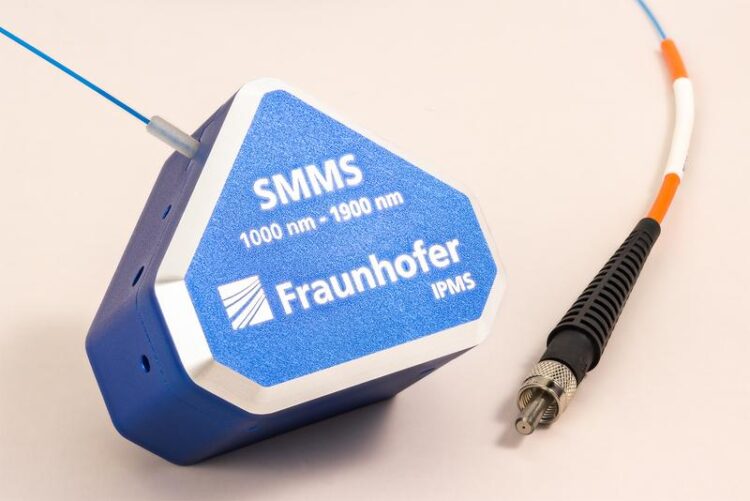Non-destructive on-site analysis of organic substances

Fiber-coupled Scanning Mirror Micro Spectrometer (SMMS) with a spectral range of 1000 nm - 1900 nm
Credit: Sebastian Lassak / ©Fraunhofer IPMS
… using a small modular spectrometer platform.
Low-cost and compact: Individually configurable spectrometer platform developed.
Compact and ultra-compact near-infrared (NIR) spectroscopy systems for the evaluation of organic substances are critical to industries as diverse as food, textiles, and pharmaceuticals. On-site, non-destructive analysis provides confidence in quality control and saves time. The non-resonant Scanning Mirror Micro Spectrometer (SMMS) platform developed at the Fraunhofer Institute for Photonic Microsystems IPMS offers a compact and cost-effective alternative to expensive benchtop devices based on line sensors and also allows individual spectrometer configuration.

Selection of possible measurement samples from the SMMS platform of Fraunhofer IPMS. Credit: Sebastian Lassak / ©Fraunhofer IPMS
With a focus on on-site applications, Fraunhofer IPMS has developed a new Scanning Mirror Micro Spectrometer (SMMS) platform based on a single-axis MEMS (Micro Electro-Mechanical System) scanning mirror. The non-resonant scanning approach offers the possibility to realize unique measurement scenarios such as the narrowing of the spectral range and the associated reduction of measurement time.
The latest IPMS microscanner technology allows different spectrometer configurations with customizable spectral range and spectral resolution. The spectral range in the standard configuration covers 1000 nm to 1900 nm, but can be customized by selecting different diffraction gratings and detectors, especially with variants up to 2200 nm and 2500 nm. The spectral resolution is ≤ 10 nm (FWHM) over the entire spectral range and can be customized by selecting a suitable entrance and/or exit slit. Individual customer evaluation kits are available on request.
In addition to the compact size, there are technological aspects that are relevant for high-volume manufacturability. Competitive manufacturing costs are achieved through the use of basic components and reduced electronic complexity, as well as efficient assembly and interconnection technology and system integration.
Application areas of the system include the near infrared spectral range in the different system variants up to wavelengths of 1900 nm, 2200 nm or 2500 nm, enabling applications in the food, textile and pharmaceutical industries. Other applications include medical and life sciences, materials processing and quality control of plastics, petrochemicals, recycling and other applications requiring reliable non-destructive on site analysis.
The novel spectrometer platform will be presented at the “analytica” trade fair in Munich from April 9 to 12. Visitors to the Fraunhofer IPMS booth A3.407 will have the opportunity to test its performance and discuss their specific requirements. Appointments for expert discussions can be made in advance via the Fraunhofer IPMS website.
About Fraunhofer IPMS
Fraunhofer IPMS is one of the leading international research and development service providers for electronic and photonic microsystems in the application fields of intelligent industrial solutions and manufacturing, medical technology and health, and mobility. In two state-of-the-art clean rooms and with a total of four development sites in Dresden, Cottbus and Erfurt, the institute develops innovative MEMS components and microelectronic devices on 200 mm and 300 mm wafers. Services range from consulting and process development to pilot production.
Wissenschaftliche Ansprechpartner:
Dr. Jens Knobbe – jens.knobbe@ipms.fraunhofer.de
https://www.ipms.fraunhofer.de/en/press-media/press/2024/modular-spectromete-platform.html
Media Contact
All latest news from the category: Power and Electrical Engineering
This topic covers issues related to energy generation, conversion, transportation and consumption and how the industry is addressing the challenge of energy efficiency in general.
innovations-report provides in-depth and informative reports and articles on subjects ranging from wind energy, fuel cell technology, solar energy, geothermal energy, petroleum, gas, nuclear engineering, alternative energy and energy efficiency to fusion, hydrogen and superconductor technologies.
Newest articles

A blueprint for mapping melting ice sheets
Researchers in the Stanford Radio Glaciology lab use radio waves to understand rapidly changing ice sheets and their contributions to global sea-level rise. This technique has revealed groundwater beneath Greenland,…

Water hyacinth plant pots – utilization of an invasive species
Together with Fiber Engineering GmbH, the DITF presents a process for the production of biodegradable plant pots. The products are cost effective and competitive. At the same time, the production…

Current research on the new 6G mobile communications standard
Nursing care robots, autonomous driving, digital twins: all of these high-tech applications will play an essential role for the new 6G mobile communications standard. The first commercial 6G networks are…



